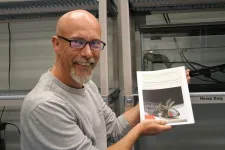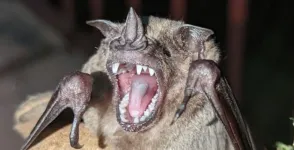(Press-News.org) Oct. 26, 2023
Media contacts:
Emily Gowdey-Backus, director of media relations, Emily_GowdeyBackus@uml.edu
Nancy Cicco, assistant director of media relations, Nancy_Cicco@uml.edu
UMass Lowell’s Nicolai Konow wants to bridge the gap between research on food processing and nutrient absorption.
“There is a divide between biomechanists, who study chewing and food transport, and physiologists, who examine what actually happens to food in the gastrointestinal tract,” said the assistant professor of biological sciences.
To help link the two fields, Konow edited and contributed to a special edition of Philosophical Transactions of the Royal Society, the world’s longest-running scientific journal. The issue, titled “Food processing and nutritional assimilation in animals,” includes 18 research papers that examine how animals, ranging from ants and sharks to monkeys, eat and digest food.
“This special issue is a call to arms for physiologists and biomechanists to start working together to get a more interdisciplinary angle on the effects of food processing on nutritional assimilation,” says Konow, a biomechanics expert. “There’s a crucial gap in our understanding of the journey of food.”
UMass Lowell alumnus and biological sciences teaching assistant Brian Richard worked with Konow to co-author a paper for the issue that establishes that all animal classes, such as mammals and amphibians, contain members that chew their food. Richard conducted research on rhythmic chewing for the publication while he was an undergraduate student at the university.
“It was very exciting to take part in research while an undergraduate, because it helped with my career development,” said Richard, whose goal is to become a professor, combining his passions for research and teaching. “Having this paper published made me feel like I’m a legit scientist now.”
Konow served as the co-author of two subsequent papers, one of which dispelled earlier studies that stated salamanders do not chew.
“Researchers back in the day didn’t have the technology that we have now,” says Konow, who used an X-ray video camera to show that salamanders chew. “Our research on salamanders substantiates the claim made in the previous paper (co-authored by Richard) that chewing is a general trait across the vertebrate tree of life.”
Konow’s other paper used salamanders as a model to understand feeding constraints among animals that transitioned from water to land more than 350 million years ago.
“Salamanders are a really powerful tool for understanding that critical transformation in evolutionary history,” he said.
Additional papers in the special issue, produced by dozens of researchers from around the world, touched upon diverse topics such as the amount of energy it takes for primates to feed, the effect of climate change on nutritional assimilation in marsupials and how ants generate bite force.
“It’s been a great honor to compile this issue,” Konow said.
END
Something to chew on: Researchers look for connections in how animals eat and digest food
UMass Lowell professor serves as editor for special issue of science journal
2023-10-26
ELSE PRESS RELEASES FROM THIS DATE:
Viral reprogramming of cells increases risk of cancers in HIV patients
2023-10-26
Viral infections are known to be a central cause of more than 10% of cancers worldwide. University of California researchers may have uncovered one of the key reasons why. Their findings were published today in PLOS Pathogens, a journal that reports groundbreaking work to advance understanding of how pathogens impact diseases such as cancer.
UC Davis Comprehensive Cancer Center researcher Yoshihiro Izumiya teamed up with Michiko Shimoda, who previously worked in the Izumiya Lab at UC Davis. Currently, she is a member of the Core Immunology Lab at UC San Francisco. Together, they led UC Davis researchers in the study of Kaposi’s sarcoma-associated herpesvirus (KSHV). The ...
Robot stand-in mimics movements in VR
2023-10-26
Media Note: Pictures of VRoxy can be viewed and downloaded here: https://cornell.box.com/v/VRoxyrobotproxy
ITHACA, N.Y. – Researchers from Cornell and Brown University have developed a souped-up telepresence robot that responds automatically and in real-time to a remote user’s movements and gestures made in virtual reality.
The robotic system, called VRoxy, allows a remote user in a small space, like an office, to collaborate via VR with teammates in a much larger space. VRoxy represents the latest in remote, robotic embodiment.
Donning a VR headset, a user has access to two view modes: Live mode shows an immersive image of the ...
Major milestone achieved in new quantum computing architecture
2023-10-26
Coherence stands as a pillar of effective communication, whether it is in writing, speaking or information processing. This principle extends to quantum bits, or qubits, the building blocks of quantum computing. A quantum computer could one day tackle previously insurmountable challenges in climate prediction, material design, drug discovery and more.
A team led by the U.S. Department of Energy’s (DOE) Argonne National Laboratory has achieved a major milestone toward future quantum computing. They have extended the coherence time for their novel type of qubit to an impressive 0.1 milliseconds — nearly a thousand times better than the previous record.
“Rather ...
"Recognition of human right to the environment can galvanize action and collaboration towards realization of sustainable development goals," eminent environmental lawyer says
2023-10-26
Amsterdam, October 26, 2023 – "The Human Right to the Environment affirms the right to life itself. When humans protect nature, they are also securing human health and wellbeing." An article by eminent environmental lawyer Prof. Nicholas A. Robinson sees the recognition of the Human Right to the Environment (HRE) as a first step in a long process of restoring a healthy environment for people and the planet.
Professor Robinson’s article is published in a special issue of the Journal of Environmental Policy and Law on The Human Right to Sustainable Environment. In the preface Editor-in-Chief Bharat H. Desai, PhD, Jawaharlal Nehru University, Centre ...
New tool measures food security duration, severity
2023-10-26
ITHACA, N.Y. – Researchers from the Charles H. Dyson School of Applied Economics and Management have developed a new method for measuring food insecurity, which for millions of people in the U.S. is more than just an abstract concept.
The group’s probability of food security (PFS) measures the likelihood that a household’s food expenditures equal or exceed the minimum cost of a healthful diet. The researchers then put the PFS to the test, analyzing food security dynamics over a recent 17-year period, and found that a third of U.S. households experienced at least temporary food insecurity.
Seungmin Lee, a doctoral student in the field of applied economics and management, ...
Excess fluoride linked to cognitive impairment in children
2023-10-26
Long-term consumption of water with fluoride levels far above established drinking water standards may be linked to cognitive impairments in children, according to a new pilot study from Tulane University.
The study, published in the journal Neurotoxicology and Teratology, was conducted in rural Ethiopia where farming communities use wells with varying levels of naturally occurring fluoride ranging from 0.4 to 15.5 mg/L. The World Health Organization recommends fluoride levels below 1.5 mg/L.
Researchers ...
Scientists find two ways that hurricanes rapidly intensify
2023-10-26
Contacts:
David Hosansky, UCAR/NCAR Manager of Media Relations
hosansky@ucar.edu
720-470-2073
Audrey Merket, UCAR/NCAR Science Writer and Public Information Officer
amerket@ucar.edu
303-497-8293
Hurricanes that rapidly intensify for mysterious reasons pose a particularly frightening threat to those in harm’s way. Forecasters have struggled for many years to understand why a seemingly commonplace tropical depression or tropical storm sometimes blows up into a major hurricane, packing catastrophic winds and driving a potentially deadly surge of water ...
Is red meat intake linked to inflammation?
2023-10-26
Inflammation is a risk factor for many chronic diseases, including cardiovascular disease (CVD), and the impact of diet on inflammation is an area of growing scientific interest. In particular, recommendations to limit red meat consumption are often based, in part, on old studies suggesting that red meat negatively affects inflammation – yet more recent studies have not supported this.
“The role of diet, including red meat, on inflammation and disease risk has not been adequately studied, which can lead to public health recommendations that are not based on strong evidence,” said Dr. Alexis Wood, associate professor of pediatrics – ...
RIT’s Campanelli receives award for work in gravitational wave science
2023-10-26
Rochester Institute of Technology distinguished professor and founding director of the Center for Computational Relativity and Gravitation Manuela Campanelli has been honored with the American Physical Society’s (APS) 2024 Richard A. Isaacson Award in Gravitational-Wave Science for her extraordinary contributions to and leadership in the understanding and simulation of merging binaries of compact objects in strong-field gravity.
The annual honor is granted to esteemed scientists for their remarkable achievements in the fields of gravitational-wave physics, gravitational wave astrophysics, and associated ...
Fruit, nectar, bugs and blood: How bat teeth and jaws evolved for a diverse dinnertime
2023-10-26
Link to full release with images:
https://www.washington.edu/news/2023/10/26/bat-teeth/
(Note: researcher contact information at the end)
They don’t know it, but Darwin’s finches changed the world. These closely related species — native to the Galapagos Islands — each sport a uniquely shaped beak that matches their preferred diet. Studying these birds helped Charles Darwin develop the theory of evolution by natural selection.
A group of bats has a similar — ...
LAST 30 PRESS RELEASES:
GLP-1 drugs associated with reduced need for emergency care for migraine
New knowledge on heritability paves the way for better treatment of people with chronic inflammatory bowel disease
Under the Lens: Microbiologists Nicola Holden and Gil Domingue weigh in on the raw milk debate
Science reveals why you can’t resist a snack – even when you’re full
Kidney cancer study finds belzutifan plus pembrolizumab post-surgery helps patients at high risk for relapse stay cancer-free longer
Alkali cation effects in electrochemical carbon dioxide reduction
Test platforms for charging wireless cars now fit on a bench
$3 million NIH grant funds national study of Medicare Advantage’s benefit expansion into social supports
Amplified Sciences achieves CAP accreditation for cutting-edge diagnostic lab
Fred Hutch announces 12 recipients of the annual Harold M. Weintraub Graduate Student Award
Native forest litter helps rebuild soil life in post-mining landscapes
Mountain soils in arid regions may emit more greenhouse gas as climate shifts, new study finds
Pairing biochar with other soil amendments could unlock stronger gains in soil health
Why do we get a skip in our step when we’re happy? Thank dopamine
UC Irvine scientists uncover cellular mechanism behind muscle repair
Platform to map living brain noninvasively takes next big step
Stress-testing the Cascadia Subduction Zone reveals variability that could impact how earthquakes spread
We may be underestimating the true carbon cost of northern wildfires
Blood test predicts which bladder cancer patients may safely skip surgery
Kennesaw State's Vijay Anand honored as National Academy of Inventors Senior Member
Recovery from whaling reveals the role of age in Humpback reproduction
Can the canny tick help prevent disease like MS and cancer?
Newcomer children show lower rates of emergency department use for non‑urgent conditions, study finds
Cognitive and neuropsychiatric function in former American football players
From trash to climate tech: rubber gloves find new life as carbon capturers materials
A step towards needed treatments for hantaviruses in new molecular map
Boys are more motivated, while girls are more compassionate?
Study identifies opposing roles for IL6 and IL6R in long-term mortality
AI accurately spots medical disorder from privacy-conscious hand images
Transient Pauli blocking for broadband ultrafast optical switching
[Press-News.org] Something to chew on: Researchers look for connections in how animals eat and digest foodUMass Lowell professor serves as editor for special issue of science journal


